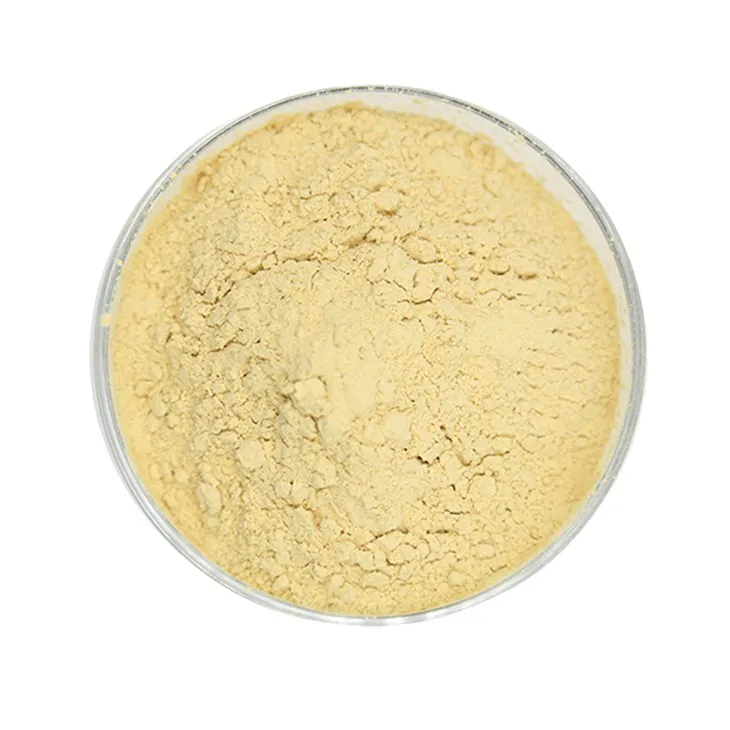- 0086-571-85302990
- sales@greenskybio.com
Have you heard of genistein? 5 Unexpected Health Benefits.
2024-11-12

Introduction
Genistein, a remarkable bioactive compound, has been increasingly in the spotlight in recent years. It is a type of phytoestrogen, which is mainly found in soybeans and other legumes. This compound has shown great potential in contributing to human health in various aspects that are often overlooked. In this article, we will explore five unexpected health benefits of Genistein.

1. Heart Health
Maintaining Normal Blood Pressure
One of the significant contributions of Genistein to heart health is its potential role in maintaining normal blood pressure levels. High blood pressure is a major risk factor for cardiovascular diseases such as heart attacks and strokes. Genistein may work by influencing the function of blood vessels.
Studies have suggested that genistein can help relax the smooth muscle cells in the walls of blood vessels. This relaxation effect allows the blood vessels to dilate, which in turn reduces the resistance to blood flow. As a result, the blood pressure can be kept within a normal range. For example, in some animal studies, it has been observed that a diet rich in genistein - containing foods led to a decrease in systolic and diastolic blood pressure levels.
Regulating Cholesterol Levels
Genistein also plays a role in cholesterol regulation. Cholesterol, especially low - density lipoprotein (LDL) cholesterol, is often referred to as "bad" cholesterol because high levels of it can lead to the build - up of plaques in the arteries. Genistein may help in reducing LDL cholesterol levels.
It is believed that genistein interferes with the absorption of cholesterol in the intestines. By doing so, less cholesterol is taken up into the bloodstream. Additionally, it may also enhance the excretion of cholesterol from the body. Some research has shown that individuals who consume genistein - rich diets tend to have more favorable lipid profiles, with lower levels of LDL cholesterol and higher levels of high - density lipoprotein (HDL) cholesterol, which is considered "good" cholesterol.

2. Cancer - Inhibiting Properties
Cell Proliferation and Apoptosis
Genistein has been the subject of extensive research in the field of cancer due to its potential to inhibit tumor growth. One of the mechanisms through which it may act is by influencing cell proliferation and apoptosis.
Cell proliferation is the process by which cells divide and multiply. In some cancer cells, this process goes out of control, leading to the formation and growth of tumors. Genistein has been shown to inhibit the proliferation of cancer cells in certain types of cancers, such as breast cancer and prostate cancer.
Apoptosis, on the other hand, is the programmed cell death. Cancer cells often evade apoptosis, which allows them to survive and continue to grow. Genistein can induce apoptosis in cancer cells, effectively getting rid of the abnormal cells. For instance, in laboratory studies, genistein has been demonstrated to trigger apoptosis in breast cancer cell lines, leading to a reduction in the number of viable cancer cells.
Antiangiogenesis
Another way in which genistein may combat cancer is through antiangiogenesis. Angiogenesis is the process by which new blood vessels are formed. Tumors need a blood supply to grow and spread, so they secrete factors that stimulate angiogenesis.
Genistein can interfere with this process by inhibiting the formation of new blood vessels in tumors. Without a proper blood supply, the tumors are unable to grow and may even shrink. Research has indicated that genistein can block the signaling pathways involved in angiogenesis, thereby starving the tumors of the nutrients and oxygen they need to thrive.

3. Bone Health
Promoting Bone Formation
Genistein is actively involved in promoting the formation of healthy bones. Bones are constantly undergoing a process of remodeling, which involves the breakdown of old bone tissue by osteoclasts and the formation of new bone tissue by osteoblasts.
Studies have shown that genistein can stimulate the activity of osteoblasts. These cells are responsible for building new bone. By enhancing the function of osteoblasts, genistein helps in the deposition of calcium and other minerals into the bone matrix, making the bones stronger. In addition, genistein may also have an effect on osteoclasts, inhibiting their excessive activity that can lead to bone loss. For example, in post - menopausal women who are at a higher risk of osteoporosis, genistein - containing supplements or a diet rich in genistein - rich foods may help in maintaining bone density.

4. Hormonal Health
Alleviating Hormonal Imbalance Symptoms
Genistein, as a phytoestrogen, can play a role in hormonal health, particularly in alleviating some symptoms of hormonal imbalance. In women, hormonal fluctuations can occur during different life stages such as puberty, menstruation, pregnancy, and menopause.
During menopause, for example, the decline in estrogen levels can lead to various symptoms such as hot flashes, night sweats, and mood swings. Genistein can bind to estrogen receptors in the body, acting in a similar way to estrogen in some tissues. This can help to relieve some of these menopausal symptoms. However, it is important to note that genistein is not a substitute for estrogen replacement therapy but can be a complementary approach. In addition, in some cases of hormonal - related acne in women, genistein may also have a positive impact by modulating the hormonal environment in the skin.
5. Antioxidant Capacity
Protecting Against Oxidative Damage
Genistein has strong antioxidant capacity, which is crucial for protecting the body from oxidative damage. Oxidative stress occurs when there is an imbalance between the production of reactive oxygen species (ROS) and the body's antioxidant defense mechanisms.
ROS can damage cells, proteins, and DNA, leading to various health problems including aging, cancer, and cardiovascular diseases. Genistein can scavenge ROS, neutralizing their harmful effects. It can also enhance the activity of the body's own antioxidant enzymes, such as superoxide dismutase (SOD) and glutathione peroxidase (GPx). By doing so, genistein helps to maintain the balance between oxidative and antioxidant processes in the body, reducing the risk of oxidative - related diseases.
Conclusion
Genistein is a bioactive compound with a wide range of potential health benefits. From heart health to cancer prevention, bone health, hormonal balance, and antioxidant protection, it has shown great promise. However, more research is still needed to fully understand its mechanisms of action and to determine the optimal intake levels for different health conditions. Incorporating genistein - rich foods such as soybeans, soy products, and some legumes into a balanced diet may be a beneficial step towards maintaining good health.
FAQ:
What is genistein?
Genistein is a bioactive compound. It has various properties and can be beneficial for our health in multiple aspects.
How does genistein help with heart health?
Genistein may help in maintaining normal blood pressure and cholesterol levels, which are important factors for heart health.
Can genistein really inhibit tumor growth?
Genistein has been studied for its ability to inhibit tumor growth in some cases. However, more research is still needed to fully understand its role in cancer prevention and treatment.
What role does genistein play in bone health?
Genistein is involved in promoting the formation of healthy bones, which is crucial for maintaining good bone density and overall bone health.
How does genistein assist in hormonal health?
Genistein can assist in alleviating some hormonal imbalance symptoms, though the exact mechanisms are still being explored.
Related literature
- Genistein: A Promising Phytochemical for Health Benefits"
- "The Role of Genistein in Cardiovascular Health"
- "Genistein and Cancer: Current Research and Future Perspectives"
- ▶ Hesperidin
- ▶ citrus bioflavonoids
- ▶ plant extract
- ▶ lycopene
- ▶ Diosmin
- ▶ Grape seed extract
- ▶ Sea buckthorn Juice Powder
- ▶ Beetroot powder
- ▶ Hops Extract
- ▶ Artichoke Extract
- ▶ Reishi mushroom extract
- ▶ Astaxanthin
- ▶ Green Tea Extract
- ▶ Curcumin Extract
- ▶ Horse Chestnut Extract
- ▶ Other Problems
- ▶ Boswellia Serrata Extract
- ▶ Resveratrol Extract
- ▶ Marigold Extract
- ▶ Grape Leaf Extract
- ▶ blog3
-
Cranberry Plants and Skin - care Products.
2024-11-12
-
Bayberry Extract
2024-11-12
-
Berberis aristata Extract
2024-11-12
-
Peppermint Extract Powder
2024-11-12
-
Polygonum Cuspidatum Extract
2024-11-12
-
Honeysuckle Pollen
2024-11-12
-
Grapefruit Seed Extract Powder
2024-11-12
-
Polygonum multiflorum extract
2024-11-12
-
Curcumin
2024-11-12
-
Passionflower Extract
2024-11-12
-
Withania Somnifera Extract
2024-11-12





















